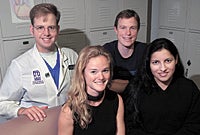Students named Schweitzer Fellows at medical school
GREENVILLE, N.C. (Dec. 15, 2001) — Following in the footsteps of a man considered to be one of the world’s greatest humanitarians, five students of the Brody School of Medicine at East Carolina University are working to change their community for the better as well.
They have been chosen as N.C. Schweitzer Fellows for 2001. They are second-year medical students Lisa Jackson, David Whetstone, Lisa Nelson and Shinu Singh, and third-year medical student Chris Scott.

Medical students, from left, Chris Scott, Lisa Jackson, David Whetstone and Shinu Singh are Schweitzer Fellows at the Brody School of Medicine for 2001. Not pictured is Lisa Nelson. Photo by Cliff Hollis.
The Albert Schweitzer Fellowship continues the legacy of Dr. Albert Schweitzer, who is viewed as one of the great humanitarians of the 20th century. The fellowship was founded in 1940 to support the work of Schweitzer in Lambarene, Gabon, during World War II. Since that time, the fellowship has continued to support the hospital there as well as other programs including local programs to address unmet health care and social needs in the United States.
Begun in 1991, there are now six local U.S. Schweitzer Fellows Programs in Baltimore, Boston, Chicago, Vermont/New Hampshire, Pittsburgh and North Carolina. During the past 10 years, more than 600 students have served as U.S. Schweitzer Fellows.
The N.C. Schweitzer Fellows Program interviews the applicants, who are selected based on their project ideas as they best fit into Schweitzer’s convictions. The N.C. program is in its eighth year with 21 fellows participating who will provide at least 3,400 hours of direct service to underserved people and their communities.
Students help Spanish speakers
Jackson and Whetstone are working on a project to provide health education materials to Hispanic patients in the Pitt County Memorial Hospital emergency department and the Fountain Indigent Care Clinic.
Both majored in biology and Spanish as undergraduates at the University of North Carolina at Chapel Hill and have traveled to Spanish-speaking countries. “I volunteered as a Spanish interpreter at UNC Hospitals and to visit Spanish-speaking patients,” Jackson said. “That gave me a lot of experience for what they wanted to talk about.”
Whetstone, of Wilmington, said, “I have an interest in meeting the needs of the underserved community like the Latino community.”
At the medical school, Jackson and Whetstone learned of the fellowships through Patrick O’Malley, a third year medical student and Schweitzer fellow last year. O’Malley’s program, Get PHED Up!, focused on getting medical students into the PCMH E.D. waiting room to talk about preventive health care with patients. “But he didn’t have anything in Spanish, and there are a lot of Spanish-speaking patients. We decided to start a program to educate Spanish-speaking patients about basic, preventative health care issues,” Jackson said.
Their program is called “Junto,” which means “together” in Spanish, “because we are uniting all of the health, spiritual and social services, circulating the knowledge about them because we couldn’t do it alone,” Jackson said.
Jackson and Whetstone are working toward assessing the needs of the Spanish-speaking population by using a survey Whetstone developed to see what the group sees as problems for them. For example, did they need more Spanish-speaking resources in the community? Most checked yes. Whetstone has collected about 300 completed surveys so far and wants more to get a full assessment of the Latino community’s needs.
Jackson created a brochure in Spanish listing medical, social and spiritual support groups “because they get here and they don’t have a car or a phone and no way of asking,” she said. They have been circulating the brochure throughout the community, at the Fountain clinic and the Pitt County Health Department.
They are also recruiting Spanish-speaking volunteers from their medical school peers and physician assistant students to educate patients about preventive health care needs at the Fountain clinic or in the E.D.